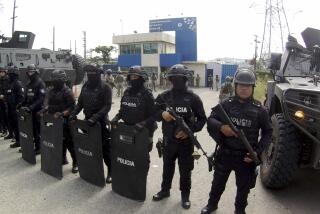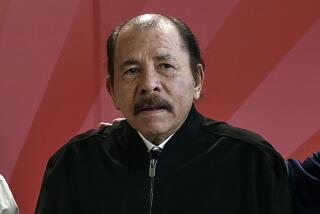Hand Noriega Over, Panama Clerics Ask Pope
- Share via
PANAMA CITY — Panama’s Roman Catholic bishops asked the Vatican on Saturday to end its diplomatic sanctuary for former dictator Manuel A. Noriega and hand him over for trial in the United States or Panama for what they call “abominable crimes.”
In a letter to Pope John Paul II, the 12 bishops said that the possibility of a negotiated exile for Noriega, who has been holed up in the Vatican embassy here since Christmas Eve, has “morally impeded” a peaceful and orderly return to democracy in Panama.
“There are well-founded reasons to fear that if he is set free in any part of the world, Mr. Noriega would in a short time be causing turmoil, conflict and violence in this country, which has already suffered enough,” the bishops said.
The letter put the bishops behind the Bush Administration, which overthrew Noriega in a Dec. 20 military invasion, and behind the new Panamanian government in pressing for the former general’s arrest.
Although a church official said the letter was cleared with the Pope’s emissary here before being made public, its likely impact is unclear. The Vatican has already rejected President Bush’s contention that Noriega is a common criminal by saying that his asylum request has a legitimate political foundation.
Noriega is wanted in the United States on drug trafficking charges, and an unfulfilled objective of the U.S. military intervention is to bring him to trial there.
While defending the practice of political asylum, the bishops said that Noriega “is a special case.”
They describe him as the “author of abominable crimes, the destroyer of his people and of his own nation.” And they noted that investigators in recent days have found torture chambers, weapons stockpiles, illegal narcotics and witchcraft paraphernalia in some of his homes.
The bishops said it did not matter whether Noriega is tried in the United States or Panama as long as there were guarantees for his physical safety, the death penalty was ruled out and he received a fair trial.
American troops still seeking Noriega’s capture have patrolled the periphery of the Vatican nunciature since Noriega slipped into the compound. On Wednesday, they began blaring amplified rock music there in a campaign of harassment.
But on Saturday, the earsplitting music stopped, following “the nuncio’s plea that the music was keeping him awake while Noriega slept,” an American official said.
By then the United States was involved in an embarrassing and a potentially costly diplomatic feud over a U.S. military raid on the Nicaraguan ambassador’s official residence here Friday.
The residence was clearly marked by a large oval shield that read: “Republic of Nicaragua.” Ambassador Antenor Ferrey said he had shown a diplomatic credential before about the American troops stormed inside, ignoring the Vienna Convention that makes diplomatic missions inviolate. After a scuffle, they held the ambassador and seven other people at gunpoint, ransacked the house and seized a cache of weapons.
The raid, part of a citywide search for hidden armaments, was abruptly called off--after 90 minutes, Ferrey said--when the colonel in charge got new instructions from his superiors.
Even so, Nicaraguan President Daniel Ortega retaliated late Friday by ordering 20 American diplomats to leave his country within 72 hours. “Nicaragua cannot let this shameful act pass unnoticed,” Ortega said.
On Saturday, a senior American official here called the raid “a mistake” because “we don’t go into diplomatic residences.”
But he characterized Ortega’s response as “disproportionate” because the officer in charge had apologized to Ferrey and given back the weapons.
Among those ordered out of Managua were the chief of the American Embassy’s political section, several other political officers and the consul general. U.S. officials said that the charge d’affaires in Managua, John Leonard, was left with just eight officers.
One impact of the incident will be to cripple the Bush Administration’s ability to monitor Nicaragua’s Feb. 25 election directly.
After years of arming rebels to overthrow Nicaragua’s Sandinista government, Washington has made the election a test of its policy toward Managua and is backing Ortega’s right-wing opponent in the vote.
Nicaragua and Cuba are Noriega’s lone allies in Latin America. The Sandinistas had sent several planeloads of AK-47 rifles to help arm his paramilitary Dignity Battalions.
After invading Panama, U.S. troops were posted outside the Nicaraguan, Cuban and Libyan embassies to try to catch Noriega if he sought refuge in one of them. When the Americans put tanks outside the Nicaraguan Embassy for three days before Christmas, the Sandinista army sent tanks to the American mission in Managua.
Ferrey, a career Nicaraguan diplomat, gave this account of Friday’s raid:
In response to a call from his home, he rushed there from the embassy at 5:45 p.m. to find the place surrounded by about 80 troops and at least five armored vehicles. Soldiers had fired three warning shots in the air and ordered the seven occupants to come out with their hands up.
Until 7:05 p.m., Ferrey tried unsuccessfully to persuade the colonel that his home was protected by diplomatic immunity. He showed a blue diplomatic credential. He asked permission to telephone the U.S. ambassador, but was refused.
The colonel consulted his superiors by radio and announced: “You’re going to let me in or we’re going in by force.”
Some of the seven people inside the two-story stucco house--Ferrey’s brother, his sister-in-law, a Panamanian couple seeking asylum in Nicaragua, two visiting Nicaraguan officials and a maid--came out on the porch and tried to help him bar the soldiers from entering.
The ambassador and an American soldier wrestled with each other and fell off the porch into the carport as the troops stormed in. One soldier ripped out the phone on which Ferrey’s sister-in-law was speaking to the Nicaraguan Foreign Ministry in Managua. She bit his arm and suffered a bruised wrist when he seized her.
While all of the occupants were held at gunpoint, the soldiers ransacked Ferrey’s study and other rooms. Beside weapons, they took shoes, clothing, cosmetics, electronic appliances and about $3,000 in cash, Ferrey said.
At 8:35 p.m., the colonel got an order from Gen. Marc Cisneros, commander of U.S. Army South, to end the raid, and everything was returned but the money, the ambassador said. He doesn’t remember an apology.
Ferrey said he made it clear enough that he was a diplomat and could only speculate that the Americans were trying to provoke violence.
He declined to comment on the weapons, which an American official said included 11 AK-47 assault rifles, 10 Czech-made rifles, four Uzi submachine guns, “numerous” hand grenades, rocket-propelled grenades, anti-tank weapons, shotguns, machetes, bayonets and “large amounts” of ammunition.
“It was far more than sufficient for what was needed to provide personal protection for him,” said Col. Ron Sconyers, spokesman for the U.S. Southern Command.
U.S. Embassy and Southern Command officials gave conflicting explanations of why the raid proceeded.
An embassy official said the house was not clearly marked and Ferrey did not show his diplomatic credentials until the raid was well under way.
A statement by the Southern Command said the commander of the raiding party saw the “Republic of Nicaragua” identification and the ambassador’s credentials before entering the house but went in any way on the basis of U.S. Embassy information that the Nicaraguan ambassador’s real residence was in another part of town.
Sconyers declined to characterize the incident as a mistake.
“We did exactly what we should have done,” he said. “But it was prudent to return the weapons.”
VATICAN ON NORIEGA: Vatican says it won’t help Noriega evade justice. A11
More to Read
Sign up for Essential California
The most important California stories and recommendations in your inbox every morning.
You may occasionally receive promotional content from the Los Angeles Times.










